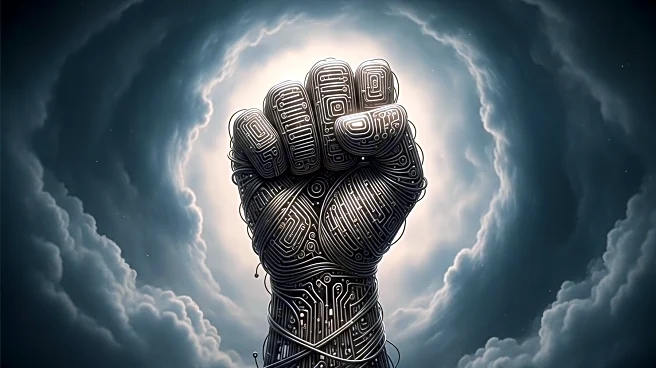What's Happening?
Gen Z is at the forefront of a wave of anti-government protests spreading across the globe, marking the most significant surge in global dissent since the Arab Spring. These protests, occurring on four continents, are driven by young people frustrated with government corruption, inadequate services, and economic mismanagement. In Morocco, protests organized by a group called 'GenZ 212' have led to clashes with security forces. In Madagascar, demonstrations against power and water cuts resulted in 22 deaths, prompting the president to dissolve the government. In Peru, pension reforms have sparked ongoing rallies, with transportation unions joining the protests. Similar movements have emerged in Indonesia and Nepal, where social media bans and government corruption have fueled unrest. These protests are characterized by their use of social media for organization and communication, allowing for rapid mobilization and anonymity.
Why It's Important?
The global protests led by Gen Z highlight a growing discontent with political and economic systems that fail to address the needs of younger generations. These movements underscore the power of social media as a tool for activism, enabling young people to connect and mobilize across borders. The protests also reflect a broader demand for accountability and transparency in governance, as well as a push for economic reforms that address inequality and unemployment. The outcomes of these protests could lead to significant political changes, as seen in some countries where governments have been toppled or forced to engage in dialogue. However, the movements also face challenges, including potential violent repression and the difficulty of achieving lasting change.
What's Next?
As these protests continue, governments may be forced to address the grievances of young people to prevent further unrest. This could involve policy changes, increased transparency, and efforts to improve economic conditions. However, the success of these movements in achieving meaningful change remains uncertain, as seen in the aftermath of the Arab Spring. The ability of Gen Z to transition from protest to governance will be crucial in determining the long-term impact of these movements. Additionally, the role of social media in facilitating these protests may prompt governments to consider new regulations or restrictions on digital platforms.
Beyond the Headlines
The Gen Z-led protests raise important questions about the future of political activism and governance. The use of social media as a tool for organizing and mobilizing protests represents a shift in how political movements are conducted, potentially reducing the influence of traditional activist groups and political institutions. This decentralization of activism could lead to more spontaneous and widespread movements, but also poses challenges in terms of leadership and coordination. Furthermore, the protests highlight the growing importance of addressing youth concerns in political and economic policies, as failure to do so could lead to continued unrest and instability.









